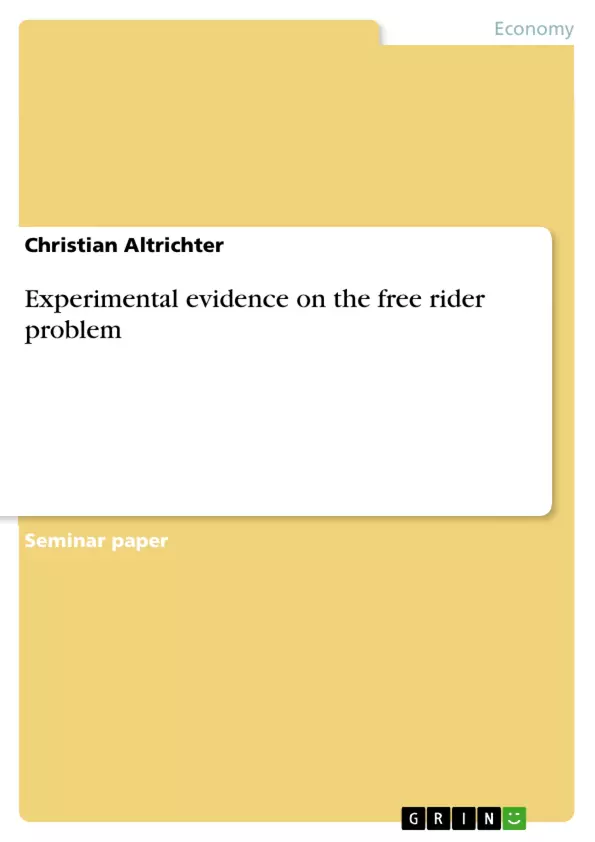This paper describes the basic elements of an experimental design, beginning with a short introduction to that topic with the example why are people contributing willingly money and why they act the way they act. Then the most commonly design of the voluntary contribution mechanisms is shortly analyzed followed from disturbing factors that might influence an experiment in an undesireable way. That may distort the evaluation process. Next to this most influencing factors are analysed which lead to different human behaviour and explain the experiments' results on factors like altruism, group size, earnings, etc. Finally a conclusion sums up and suggests an experiment over the internet where the "experimentator" is able to follow the decision process in a kind of chatroom.
Dieses Paper bietet ein Übersicht über experimentelle Rahmenbedingungen, die sich mit dem "Trittbrettfahrerverhalten" beschäftigen. Dabei wird nach einer Einleitung auf die grundsätzlichen "Basisbeschaffenheiten" eines Experiments abgestellt und es werden mögliche verzerrende (nichtintendierte) Faktoren analysiert, die das Expermiment "verfälschen" können. Schließlich werden Erklärungsansätze für die unterschiedlichen experimentellen Resultate anhand der wichtigsten Einflussgrößen wie Altruismus, Gruppengröße, Lerneffekte, u.a. erklärt. Im Fazit wird dann ein letztes Beispiel gebracht, in dem die Interaktionen zwischen den Teilnehmern beobachtet werden können, da das Experiment über das Internet durchgeführt worden ist und es werden Dinge aufgezeigt, die künftig noch zu erforschen sind.
Table of Contents
- 1. General Introduction
- 2. Introduction to free-riding experiments
- 2.1. Experimental design
- 2.2. The Voluntary Contribution Mechanism
- 2.3. "Contradictional effects"
- a. Public good is not "pure".
- b. Unknown group optimum / payoff
- c. Misunderstanding
- d. Uncertainty
- e. Insufficient economic incentive
- f. Small groups
- g. Interactions
- 2.4. Explaining different Experimental results
- 2.4.1. Altruism and Warm Glow
- 2.4.2. Framing
- 2.4.3. Influence of MPCR and Group Size
- 2.4.4. Learning
- 2.4.5. Communication
- 3. Conclusions
Objectives and Key Themes
This seminar paper explores the concept of free-riding, a phenomenon where individuals benefit from a public good without contributing to its provision. The paper examines experimental evidence on free-riding behavior in the context of public good provision. The paper aims to understand the factors influencing individuals' decisions to contribute or free-ride and to explore the implications of these findings for the provision of public goods.
- The free-rider problem in the context of public goods
- Experimental methods for studying free-riding behavior
- Factors influencing individual contributions to public goods
- Theoretical explanations for free-riding behavior
- Implications for public good provision
Chapter Summaries
- 1. General Introduction: This chapter introduces the concept of free-riding and its relevance to the theory of public goods. It explores the contradiction between traditional utility theory and observed altruistic behavior. The chapter highlights the difficulty of defining and measuring free-riding and outlines the importance of experimental studies in understanding this phenomenon.
- 2. Introduction to free-riding experiments: This chapter delves into the experimental methodology used to study free-riding. It discusses the Voluntary Contribution Mechanism (VCM) and the “contradictional effects” that can influence individuals’ decisions. The chapter also explores various factors that have been found to affect free-riding behavior, including altruism, framing, group size, learning, and communication.
Keywords
The key terms and concepts explored in this seminar paper include public goods, free-riding, experimental economics, voluntary contribution mechanism, altruism, framing, group size, learning, communication, and social dilemmas.
Frequently Asked Questions
What is the "free rider problem" in economics?
The free rider problem occurs when individuals benefit from a public good without contributing to its provision, leading to potential under-provision of the good.
How is free-riding behavior studied experimentally?
Experiments often use the Voluntary Contribution Mechanism (VCM), where participants decide how much of their endowment to contribute to a common pool.
What factors influence a person's decision to contribute?
Key factors include altruism, "warm glow" effects, group size, communication between participants, and how the decision is framed.
What are "contradictional effects" in experimental design?
These are factors that can distort results, such as misunderstandings of the rules, uncertainty, or insufficient economic incentives for the participants.
Can free-riding be reduced through communication?
Yes, experimental evidence suggests that communication among group members often increases contribution levels and reduces free-riding.
- Arbeit zitieren
- Christian Altrichter (Autor:in), 2006, Experimental evidence on the free rider problem, München, GRIN Verlag, https://www.grin.com/document/70368



